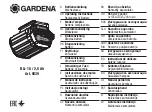
SPEED MAX
Good posture of high-speed riding
Please refer to Page 31
for more explanation
There is increased stability in the forward motion when riding at a normal speed, and therefore, the scooter will not
sink even when there is a certain level of negative buoyancy.
Because the diver's entire body is being hit with an appropriate amount of water current, using the body as a rudder
for steering and hands as breaks is very effective thus providing a high level of freedom in underwater movement.
Therefore, when riding in an area where water depths vary,
buoyancy that is perfectly neutral can actually prove to be
a hindrance. However, in traveling long distances through
water with constant depth, it is better to attain neutral
buoyancy, since this will improve battery efficiency and
make it easier for the diver to stay underwater.
Under normal speed, the diver can make left or right turns easily by
using the body as a rudder for steering and the hands as breaks.
The diver must try to maintain directional control while moving forward
by bending your body at the waist towards the target or direction
you intend to travel.
Similarly, in high-speed riding, having slightly negative buoyancy will make it easier to maintain control.
Riding form is very important for high-speed riding.
The diver should be aware of the surrounding water current, and keep the frontal body area as low profile as
possible. Also, the diver should try to reduce drag and may obtain increased speed by holding one fist out in front
of the body.
At high speed, the difference between Pitch 1 and Pitch 2 is very subtle.
At Pitch 1, the maximum level of efficiency cannot be achieved unless the divers equipment is low profile and body
posture is good.
The turning radius becomes larger at high speed, and therefore the diver must be careful of obstacles.
■
Normal-speed riding (propeller pitch = 2 ; accelerator position = 6 - MAX)
■
High-speed riding (propeller pitch = 1 or 2 ; accelerator position = MAX)
30






































